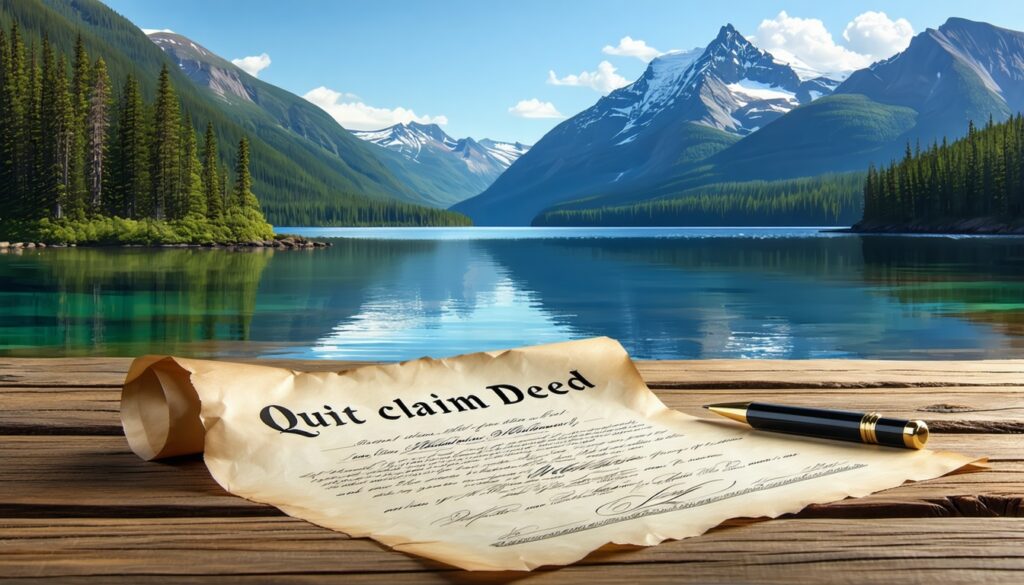
Diving into property stuff can feel like untangling a heap of yarn, especially in legal terms. In Alaska, figuring out real estate deals, particularly if you’re dealing with a quit claim deed, is key if you want the handover of a property to go as smooth as butter.
So if you’re planning to pass on your cabin to a cousin, sort out who owns the family lodge, or make changes on the paperwork for your lakeside retreat, getting the hang of how to file a quit claim deed in Alaska is downright essential. I’ve got my detective hat on in this walkthrough to shed some light on the nitty-gritty involved in transferring property in the great state of Alaska.
Knowing how the legal game is played up here is like having a map when you’re hiking through the vast wilderness. Using a quit claim deed can change your real estate game altogether. I’m here to give you the full scoop on the steps to take, and what rules you need to follow when using quit claim deeds here. My goal is to arm you with the smarts you need to tackle these matters like a pro. We’ll cut through the confusion, bust some myths, and make sure you’re able to tackle property deals like it’s your day job.
- What Is a Quit Claim Deed?
- When Should You Use a Quit Claim Deed in Alaska?
- How to File a Quit Claim Deed in Alaska
- Legal Requirements for Quit Claim Deeds in Alaska
- Who Can Prepare a Quit Claim Deed?
- What Happens After You File?
- Can a Quit Claim Deed Be Contested or Reversed?
- Special Rules and Considerations in Alaska
- Quit Claim Deeds and Taxes
- Common Questions About Quit Claim Deeds in Alaska
- When to Look for Legal Help
- Alternatives to a Quit Claim Deed
- Final Checklist Before Filing
What Is a Quit Claim Deed?
Let’s get down to what a quit claim deed really means before we dive headfirst into all the legal mumbo jumbo. Here, we check out what it is, how it ticks, and how it’s different from the other tagalongs in the deed family.
Definition and Basic Function
A quit claim deed is a nifty piece of paper that says, “Hey, I’m handing over whatever claim I might have on this property to you.” The handover happens between the current owner (grantor) and the lucky recipient (grantee). Unlike its cousin, the warranty deed, the quit claim deed doesn’t sprinkle any fairy dust of guarantees about the property’s title being squeaky clean or claim-free.
It’s your go-to tool for quick and friendly transfers, like when family members want to shift property around or a couple sorting stuff during a split. But there’s a catch—it doesn’t wrap the new owner in a protective bubble when it comes to questions about who really owns what.
How It Differs From Other Deeds
So, how is this deed different from the rest of the gang, you ask? Think of warranty deeds like your trusty friend going, “I’ve got your back, this property is clear.” Quit claim deeds? They’re the quiet passers-by saying “Here, whatever I have is yours,” without any added reassurances.
With a quit claim deed, you’re stepping into a bit riskier territory since you’re not promised rock-solid ownership. If the title has skeletons in the closet, you might be in for a surprise. Both ends of the transaction should totally be aware of these quirks and maybe give a lawyer a call if there’s any confusion.
Having this down pat, especially in the Last Frontier—yeah, I’m talking about Alaska—makes things smoother when swapping property. If you’re itching for more insights or a touch of expert advice on these deeds or any real estate puzzles, Law Karma’s got your back.
When Should You Use a Quit Claim Deed in Alaska?
Figuring out when to use a quit claim deed in Alaska can be tricky, but it sure helps make property deals go smoother. Getting to grips with when this document is your go-to and when to maybe steer clear lets you skip the headache and make smart property decisions.
Common Scenarios
Moving Property Around the Family: We often use quit claim deeds for passing property between relatives, like handing it over as a gift or putting someone’s name on the title just because they’re family.
Straightening Out Who Owns What: If there’s a squabble over who owns a chunk of property, a quit claim deed might be your peace offering to sort it out and clean up any ownership murkiness.
Switching Up Ownership Records: When life happens, like a marriage or divorce, and the title needs updating, a quit claim deed is your buddy to make sure the paper trail matches real life.
Changing Who’s on the Deed in Marriages: Be it adding a new spouse to the title or removing an ex, a quit claim deed helps you tidy up the records to reflect who’s who.
Shifting Property into a Trust: If it’s time to move a place into a trust, using a quit claim deed can make the whole process of legally transferring ownership quick and painless.
When Not to Use One
Formal Buying or Selling: When buying or selling a property, especially if money’s on the line, a quit claim deed isn’t your go-to since it doesn’t promise the protection a buyer often needs to feel secure.
Clearing Up the Title: When your transaction involves a lot of cash, like buying a home, figuring out unclear titles with a warranty deed might be better, just to be on the safe side.
Taking Over a Mortgage: Using a quit claim deed doesn’t free someone from their mortgage responsibilities. When assuming a mortgage, keep in mind this might not cut it.
Property Mystery Issues: If there are skeletons in the closet like old liens or hidden legal troubles, a quit claim deed probably isn’t gonna fix these unknowns efficiently.
For those twisted real estate deals or dicey legal matters, getting legal advice doesn’t hurt, especially if you’re in the dark about quit claim deeds. In Alaska, Law Karma is around to match you up with the right lawyer to get the straight info you need for all those property puzzles.
How to File a Quit Claim Deed in Alaska
Filing a quit claim deed in Alaska isn’t exactly a walk in the park, but it doesn’t have to be an unsolvable puzzle either. Let’s break down the essentials so you can glide through this process with fewer bumps and more confidence.
Step by Step Process
You’ll need to tick a few boxes to get a quit claim deed done right in Alaska. Here’s a do-it-right list to follow:
Prepare the Deed: Start off by drafting that quit claim deed. Be sure it’s all filled out with the important stuff: who’s giving and who’s getting the property, what’s being passed over, and where all the dots are dotted and the tees crossed. Getting a legal pro on board can be a smart move to make sure everything’s kosher with Alaska’s rules.
Notarize the Deed: Now, this is where signatures step into the spotlight. Both the giver (grantor) and the getter (grantee) gotta put their John Hancocks on the deed, and yes, they gotta do it while a notary public is watching to make it count.
Record the Deed: Time to make it official—hand over that stamped quit claim deed to the recorder’s office in the Alaska spot where the property is. They’ll pop it into the public records for you, making it nice and official.
Required Documents and Information
You’ll need a few important documents tucked under your arm when you’re marching into the land of quit claim deeds in Alaska. Here’s your checklist:
- Property Description: Get into the nitty-gritty with a detailed run-down of the property you’re handing off. This means the legal ID and the street address.
- Names of Grantor and Grantee: You need the full names of everyone involved in the trade-off—no nicknames here.
- Notary Acknowledgment: This bit confirms all the signatures are legit, thanks to our trusty notary.
- Recording Fees: Yes, there’s a bit of cash to part with for recording. It varies depending on where you’re filing.
Where and How to Submit
To make it all official in Alaska, hop over to the recorder’s office in the borough where your property lives. Each spot has its own quirks and fee tags, so give them a call or get some legal wisdom for detailed insights on making everything right:
- Anchorage Borough: Drop by the office here to get started [Insert Address].
- Fairbanks North Star Borough: Head to their office at [Insert Address].
- Juneau Borough: Need to file in Juneau? Swing by [Insert Address].
Every place ticks a little differently, so a quick chat or a bit of advice from a legal buddy can make sure you’re not missing a beat when you submit your quit claim deed.
Sorting out a quit claim deed in Alaska means rolling up your sleeves, knowing what’s up, and sticking to the rules. By keeping details straight and boxes checked, you’re more than equipped to slide through the property transfer maze via the trusty quit claim deed route.
Legal Requirements for Quit Claim Deeds in Alaska
Handling quit claim deeds in Alaska means sticking to a few vital legal steps to make sure you’re doing it right. Two big parts of the puzzle are getting the paperwork notarized and recorded correctly.
Notarization and Witnessing Rules
In Alaska, you gotta get a quit claim deed notarized to make it official. Basically, the person giving away their property needs to sign the deed in front of a notary public. The notary checks who they are and makes sure they’re signing on their own will.
Now, although having witnesses is not a must in Alaska, it’s not a bad idea to bring along a couple of friends when you’re signing. If you do, they should also sign the document to back up the legitimacy of the deal.
Recording With the Local Recorder’s Office
Once the quit claim deed is all signed, stamped by a notary, and maybe witnessed, it’s time to file it with the local recorder’s office in the area where the property is. Recording it makes it part of the public record, which helps clear up who actually owns the place.
What you usually do is take the original deed and any fees to the recorder’s office. They’ll enter it into the official records, making the property transfer legit in the eyes of the law and securing everything for both the old and new owners.
If you want to know exactly what fees and rules apply for recording a quit claim deed in Alaska, the best bet is to hit up the local recorder’s office and get the scoop for your area.
By paying attention to these rules about notarization, witnessing, and recording, you’re making sure the quit claim deed is legally airtight and the transfer goes through without a hitch. To iron out the wrinkles and avoid any hiccups, chatting with a legal advisor or a real estate attorney can really help.
Who Can Prepare a Quit Claim Deed?
Before jumping into writing a quit claim deed in Alaska, let’s chat about who can actually put this together and what risks lurk in the shadows. Should we call in a legal eagle or roll up our sleeves with a DIY form? And what could go wrong if we skip a lawyer’s eye?
Using an Attorney vs. DIY Forms
When it comes to whipping up a legal paper like a quit claim deed in Alaska, it can feel like you’re trying to navigate a maze blindfolded. Alaska’s got its own set of hoops to jump through, which is why some folks think it’s smart to tag in a real estate attorney. An attorney is like your GPS for real estate; they’ll steer you through legal twisters, check deeds, and foresee any potholes on the route. Plus, they offer advice that’s all about your situation, so you don’t end up tangled in red tape or worse.
Risks of DIY Without Legal Review
Now, say you decide the DIY route is the way to go; maybe there’s an itch to save some bucks. But beware, friend, because the ride can get bumpy. Those templates you find online? They might not have the Alaska-specific tricks you need up their sleeves. You might end up with a deed that’s got more holes than Swiss cheese, and that could spell trouble – like the deed getting tossed out or, even uglier, legal grumbling down the track.
Skipping out on legal help could mean missing key bits. Maybe it’s the way the land’s described, the signatures needed, or even ticking off the right boxes for recording. These slip-ups can bring a world of hurt with issues on who owns what and how valid the transfer is.
The DIY path might look like you’re saving some cash at first, but think about fumbling through incorrect deeds. The costs from those headaches can quickly snowball. There’s something to be said about playing it safe and getting a savvy real estate attorney to give the advice and support needed to get that deed ready and dressed for the occasion.
Yes, the world of property deals in Alaska can seem like you’re stepping into the wilderness, but with the right guide, you can stroll with confidence and keep your stakes secure. Whether you buddy up with an attorney or brave the waters solo, it’s key to weigh what might happen with each move. That way, your quit claim deed doesn’t just make it to the finish line; it wins the race.
What Happens After You File?
So you’ve filed that quit claim deed in Alaska. High five to you! Now, let’s make sense of what comes next in the grand scheme of transferring ownership. Hang tight!
Timeline for Ownership Transfer
After the paperwork hits the local recorder’s office, the timeline for sealing the deal isn’t a one-size-fits-all. Usually, it can take anywhere from a few weeks to several months. Why the wait? Well, it’s like waiting at a busy deli — depends on how swamped the recorder’s office is, if they’ve got a pile-up of deeds to handle, and whether your paperwork was as spotless as a cat’s conscience.
Receiving the Recorded Deed Back
Once the local recorder’s office has their way with your deed, it’ll boomerang back to you once the ink is dry. Consider this recorded deed your golden ticket — it’s proof you’re now officially the landlord (or landowner, rather) of that piece of earth. Best to stash this official paper in a vault-like spot. Remember, if any ownership scuffle crops up down the road, having this in your back pocket is like an ace up your sleeve.
Keep an eye on how long things take and make sure you get that recorded deed back. These steps are key in acing the quit claim deed game in Alaska. Handle it right, and you’re golden in locking down your property rights legally and neatly.
Can a Quit Claim Deed Be Contested or Reversed?
Now, dealing with quit claim deeds isn’t always a walk in the park. Sometimes, things can get a bit messy, and you might find yourself needing to pull the brakes and reverse that deed. It’s essential to get your head around the legal groundwork and avoid those typical slip-ups that can stir the pot.
Legal Grounds for Reversal
A quit claim deed isn’t set in stone. There are certain situations where you can challenge or even undo it, like:
- Tricky Business: If someone was bullied, tricked, or hoodwinked into signing, the deed can be taken to court and possibly thrown out.
- Mind Not in the Right Place: If the person handing over the deed wasn’t all there mentally when they signed, the deed could be considered invalid and canceled.
- Heavy Handed Persuasion: If someone was getting too pushy or bossy, making the grantor sign, that deed might be ripe for a fight and maybe even revised.
- Goofed Legal Stuff: Any oopsies in how the deed got made or signed off could mean it’s open to challenge and cancellation.
Got a hunch your deed’s gone sideways? Best to get a lawyer friend on the case. They’ll help you see if you can challenge it, hold your hand through the court hoopla, and fight in your corner if things get heated.
Common Mistakes That Cause Disputes
Stepping on a few banana peels in the process of making a quit claim deed can lead to some serious head-scratching moments. Here are a few:
- Whoops, Wrong Address: An unclear or incorrect property description can lead to headaches about who owns what and where the property line ends.
- Show Me the Money: Forgetting to spell out what the property’s being traded for can cast doubt on the whole deal’s legit.
- Notary Oopsies: If the notary bit isn’t tip-top, it could mean the whole deed’s on shaky ground.
- Missing John Hancocks: Everyone’s got to mark their spot. If just one person forgets, it can lead to confusion about who really owns the land.
- Recording Blunders: Skipping the step of lodging the deed at the local office, or messing it up when you do, can trouble the waters quite a bit.
Tread carefully, get some legal backup when whipping up these deeds, and don’t skimp on the details. This game plan is how you dodge hassles and make sure things stay nice and smooth for everyone in on the deal.
Special Rules and Considerations in Alaska
Getting your head around the nitty-gritty of property deeds in Alaska is like learning a dance routine that’s got a few extra steps. Here, we’re diving into three biggies: transfer-on-death deeds, who gets what when couples split, and how each borough has its own quirky rules about recording deeds.
Does Alaska Allow Transfer-on-Death Deeds?
You ever wish you could just sign a paper, and someone else would get your house like magic after you’re gone? Well, in Alaska, transfer-on-death deeds let you do just that. These deeds give property owners the power to name who gets their real estate when they’re not around anymore, dodging the whole probate mess. It’s like setting up a direct flight to inheritance land for your property, saving your loved ones a potential legal layover.
Community Property and Spousal Rights in Alaska
If you’re married in Alaska, the house you bought isn’t automatically “ours” in that “what’s mine is yours” kind of way. Unlike states that bundle marital assets as community property, Alaska goes for a fair split, or equitable distribution, when there’s a divorce. That means the court plays a bit of referee to decide who gets what.
But in the game of who-gets-what-when-someone-dies, a spouse holds a trump card. Even without a nod in a will, a surviving spouse can claim a share of the estate. Wrapping your head around these rights ensures you’re not throwing a wrench in the works when planning who gets Aunt Edna’s ring collection.
Recording Rules by Borough
Alaska’s got its own idea of keeping property deeds in check, and each borough dances to its own tune. Knowing the recording rules where your property lives helps keep the gears lubricated so the whole deed-filing thing doesn’t grind to a halt.
Keeping these Alaska-centric rules straight in your head means you can swagger through the quitclaim deed process without stepping on legal toes. And if getting all this straightened out gets tangled, Law Karma’s got your back with the right legal eagle to sort it all out.
Get a grip on the nitty-gritty of property deeds in Alaska so you can relax, knowing your rights and stuff are sitting pretty.
Quit Claim Deeds and Taxes
Let’s chat about quit claim deeds in Alaska and how taxes come into play. Here’s the lowdown on what you need to know:
Does the Internal Revenue Service (IRS) Get Notified?
Filing a quit claim deed in Alaska doesn’t send a direct memo to the IRS. That said, changing hands in property ownership can stir up some tax obligations. It’s a good idea to get a tax guru or a lawyer involved to figure out the tax bits that come with moving property from one person to another.
Gift Tax Implications
Swapping property with a quit claim deed is like gifting it for tax reasons. Whether you’ll be saying hello to the gift tax man depends on how much the property is worth and your connection to the other party in the swap. Alaska has its own rules about gift taxes, so having a professional in your corner can help you get through any tax hoops.
Does This Affect Property Taxes?
Using a quit claim deed might not mess with property taxes too much. Your local folks base taxes on what they think the property is worth. However, when the deed trades hands, popping by the assessor’s office to update the records will keep everything squared away on future tax bills.
Getting a handle on taxes tied to quit claim deeds in Alaska helps you make savvy property moves. Tap into the knowledge of legal eagles and tax wizards to keep things above board. For more insights on legal tweaks in property changes, check out our piece on small claims court Alaska and see how Law Karma can link you with the best attorney for your needs.
Common Questions About Quit Claim Deeds in Alaska
Filing a quit claim deed in Alaska might seem like a trek through uncharted territory. Trust me, I’ve had my fair share of head-scratchers on this journey. Let’s get into the nitty-gritty of what you might want to know:
What is the cost of filing a quit claim deed?
When you’re setting this puppy sail, expect it to cost you. Fees differ depending on where your property lays its roots. Here’s how some Alaska counties shake out:
| County | Recording Fee |
|---|---|
| Anchorage | $250 |
| Fairbanks North Star | $300 |
| Juneau | $200 |
Can I sell a house with a quit claim deed?
Sure thing, you can hand over the keys using a quit claim deed. But remember, it’s like selling your car without promising it won’t break down tomorrow. The new owner gets what you got—warts and all. Buyers might want to dig around to make sure they’re getting the whole enchilada.
Does a quit claim deed override a will?
Nope, a quit claim deed can’t just give your will the boot. It hands over your ownership while you’re here, but once you’ve clocked out, the will takes charge of doling out your stuff. Better make sure your will and deed are on the same page to avoid any family feuds.
Is it possible to remove someone from a quit claim deed?
You’d think removing someone would be as easy as tearing out a page, but not quite. Everyone involved has to agree to the change and sign on the dotted line. A lawyer might come in handy to help keep things tidy and proper.
How long does a quit claim deed give you ownership?
As soon as the ink’s dry and the courthouse gives you a nod, it’s official. You’re the proud owner, plain and simple. Keep that deed tucked away safely, though—it’s your golden ticket for any dealings down the road.
Navigating the world of quit claim deeds can be a bit of a rollercoaster, but I’m here to help you through it. To avoid any bumps, consider hollering at a real estate attorney who’s seen it all—it’s worth the peace of mind.
When to Look for Legal Help
Tackling legal documents like quit claim deeds might feel a bit much, especially when things don’t go as smoothly as planned. Here’s when you might need a lawyer on your side, and a peek into what it might cost in Alaska.
Red Flags That Mean You Need a Lawyer
If you’re scratching your head at the thought of transferring property with a quit claim deed, a lawyer could be your best friend. Watch out for these warning signs telling you to dial up the pros:
- Tricky Ownership Issues: Too many cooks in the kitchen, or when who owns what isn’t clear as day.
- Fights or Liens: If there’s bad blood over the property or someone’s got a financial hold on it, things can get messy fast.
- Tailored Legal Advice: Got a situation that’s got you in a tizzy? Personalized legal help is key.
Having a savvy lawyer on your speed dial can keep your rights safe and sound while sidestepping any legal landmines that might pop up.
What Lawyers Might Charge in Alaska
Lawyer fees in Alaska can swing wide—you’ll find it depends on how tangled your case is, how seasoned the lawyer is, and what you’re asking them to do. Here’s a rough guide to how they might charge:
| Fee Type | What’s the Deal |
|---|---|
| Hourly Rate | They might bill by the hour, anywhere from $200 to $400 or even more, depending on their mojo. |
| Flat Fee | Some offer a set price for straightforward stuff like eyeballing documents or chit-chat consultations. |
| Contingency Fee | In cases like personal injury, they might only get paid if you do, taking a cut of what you win. |
| Retainer Agreement | An upfront deposit that they whittle down as they clock their time on your case. |
Make sure you chat about fees right off the bat to dodge any nasty surprises. Getting legal help is like insurance for smooth sailing when you’re dealing with a quit claim deed in Alaska.
Alternatives to a Quit Claim Deed
When it comes to swapping property titles in Alaska, a quit claim deed ain’t your only friend. There are other roads to travel, each with its own perks and quirks. Let’s check out three popular alternatives:
Warranty Deed
Think of a warranty deed as your trusty seal of approval. This document not only says you own the place but assures the buyer they’re not stepping into any hidden messes from the past. Unlike a quit claim that just hands over whatever claim you might have, this one’s a bona fide promise.
| Feature | Warranty Deed |
|---|---|
| Ownership Promise | Yes |
| Buyer Safety | High |
| Where It’s Used | Real Estate Deals |
Got someone buying your place? A warranty deed can keep them snoozin’ soundly knowing they won’t get any nasty surprises about the house’s past. It throws a legal safety net over both sides in the deal.
Transfer-on-Death Deed
This mouthful of a deed lets you pick who gets your digs when you knock on heaven’s door. No messy court dates involved.
| Feature | Transfer-on-Death Deed |
|---|---|
| Bye-bye Probate | Yes |
| Transfer Happens | After Owner’s Passing |
| Control While Alive | Limited but Present |
If you want to leave your place to someone without all the legal fuss later, this deed could be your go-to. Just make sure to follow the fine print when figuring out how to set it up.
Survivorship or Joint Tenancy Options
Two or more folks can own a shared piece of paradise, and if one checks out, the rest automatically get the keys without dealing with probate.
| Feature | Survivorship/Joint Tenancy |
|---|---|
| Pass the Buck | Instantly on Death |
| Ownership Split | Equal Usually |
For those looking to buddy up on ownership and want a hassle-free transition if one of ‘em bites the dust, this setup might just do the trick. Make sure everyone knows the score and what it all means for their stake.
Chew over these alternatives to a quit claim deed, and you’ll be better armed to choose the best path for your property shift. A chat with someone in the know might also lend you a helping hand in figuring out what checks all your boxes.
Final Checklist Before Filing
If you’re gearing up to file a quit claim deed in Alaska, some pre-filing thoughts can make the difference between a smooth ride and a bumpy one. Plus, once you’ve filed, a few follow-up tasks will seal the deal on transferring ownership properly.
Pre-Filing Considerations
Before you dive into the quit claim deed process, it’s wise to gather your ducks. Here are a few things to think about:
- Property Information: Double-check all details about the property—get those legal descriptions and current ownership records right.
- Title Search: Sniff out any lurking liens or ownership tangles that might muddy the waters during the transfer.
- Consultation: Having a chat with someone in the know about Alaska real estate laws ain’t a bad idea. They can clue you in on what to watch out for.
- Drafting the Deed: Make sure that deed shines, with every “i” dotted and “t” crossed—and get every party’s signature.
- Witnesses: Alaska’s got rules about notarization and witnessing, so line up some folks to witness those signatures.
Handling all these beforehand can keep things humming along without a hitch when you file that quit claim deed.
Post-Filing Follow-Up
Once you’ve filed the quit claim deed, a few more steps will wrap things up neatly. Here’s a checklist to keep you on track after filing:
- Recording Confirmation: Check with the local recorder’s office to confirm the deed made its way onto the records.
- Ownership Update: Make sure the new deed shows the right ownership details, with all essential signatures in ink and smiling.
- Receipt of Deed: Once the magic is done, you’ll get back the recorded deed—your official proof of ownership change.
- Review and Store: Double-check the details for peace of mind, then tuck it away safely for whenever you might need it down the line.
With these post-filing actions, you’ll be wrapping up that ownership transfer like a pro. A bit of order and close attention here ensures everything lands just where it should in Alaska.






